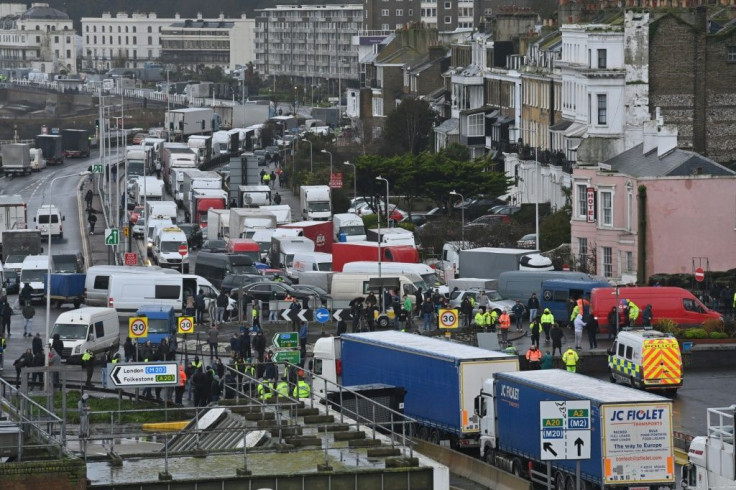British COVID-19 Strain: What Is A Lateral Flow Test?
KEY POINTS
- Truck drivers are required to take a fast test to travel between France and the U.K.
- The protocol calls for lateral flow testing, which can return questionable results
- A new strain of COVID-19 found in the U.K. is highly transmissible
The British government said late Tuesday it reached an agreement with France to reopen their shared border for trade provided delivery drivers pass a test for COVID-19 that has been widely criticized for its accuracy.
A near-global ban on travel to and from the U.K. was enacted after the spread of a more transmissible mutated strain of COVID-19 swept through the south of the country. That created massive lines of trucks queued up at the border, leaving British shelves bare just days before the Christmas holiday.
Late Tuesday, the British and French governments announced the border would reopen provided travelers tested negative for COVID-19 within 72 hours of departure using a controversial lateral flow test.
“All lorry drivers, irrespective of nationality, will require a lateral flow test,” the agreement reads. “This can detect the new strain of COVID-19 and provide results in around 30 minutes, rather than the 24 hours required after a PCR test.”
Lateral flow tests involve a swab of the nose and throat to collect samples, which are then placed in a tube of liquid. Drops from that solution are then put on a test strip that can reveal results in about a half hour.
The announcement from the British and French governments followed a report from The Guardian newspaper questioning the accuracy of lateral flow tests. The British government scrapped plans to have domestic COVID-19 testing sites use the quicker test over that issue.
The Guardian referenced official data from mass testing programs in Liverpool that showed lateral flow tests missed about half of the positive results derived from the standard testing protocol, the PCR (polymerase chain reaction) method that requires off-site testing before results are known.
Jon Deeks, who heads a test evaluation research group at the University of Birmingham, said lateral flow tests were not the best option available to determine a COVID-19 infection.
“There’s a big risk this test will give a lot of false reassurance which will inevitably lead to more COVID disease,” he told The Guardian
That false reassurance could complicate efforts to control the mutated strain of COVID-19. On Tuesday, the Centers for Disease Control and Prevention said it was concerned the new strain, dubbed B.1.1.7, may already be present in the U.S.
On Sunday, New York Gov. Andrew Cuomo called for a travel ban for passengers flying to the U.S. from Britain out of fears that a passenger infected with a mutated strain of COVID-19 would travel to the state.
“It's high time the federal government takes swift action, because today that variant is getting on a plane and landing in JFK, and all it takes is one person,” he said in a statement.
The various vaccines for COVID-19 are widely expected to be able to innoculate against the mutated strain.

© Copyright IBTimes 2025. All rights reserved.





















